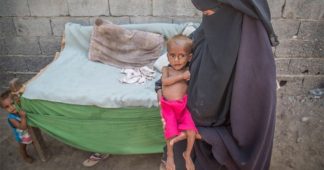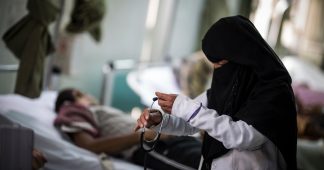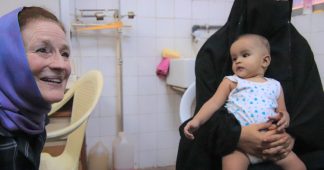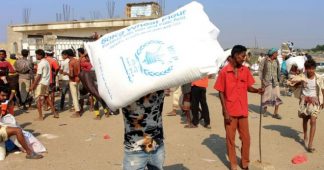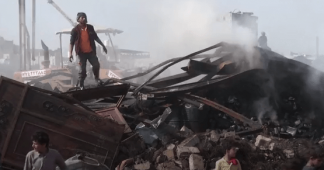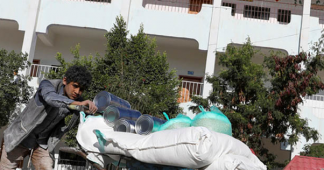War, hunger and devastating aid cuts have made the plight of Yemenis almost unbearable
by Bethan McKernan
in Ataq, Yemen
27 Nov 2020
On a ward in Ataq general hospital, in the dusty central province of Shabwa in Yemen, six-month-old Muna Bassam is lying on her back, eyes closed, her distended belly moving up and down with the labour of breathing.
In the corridor outside her room, a poster shows before-and-after photos of several children admitted to the ward who have managed to recover from acute malnutrition – still painfully thin, but smiling and alert.
Muna’s family have already taken her to hospital once before. Worried about being able to pay for her treatment and fuel to return to the village, their prayers for her this time around are even more urgent.
“My wife and I had 20 children. Eleven of them died,” said the baby’s grandfather, Abdullah. “But that was a long time ago. This should not still be happening today.”
Elsewhere in the overwhelmed hospital, children are suffering with cholera, diphtheria and dengue fever, contagious diseases that have stalked Yemen since the outbreak of war six years ago. For patients and doctors here, in what the UN says is the world’s worst humanitarian crisis, coronavirus barely registers.
“We don’t have a neurosurgeon. We don’t have a maternity ward. We treat 20 children a month for malnutrition and now we are admitting more and more people severely ill with complications from dengue fever – more than 3,000 cases so far this year. The generator doesn’t always keep the equipment on,” says Dr Ali Nasser Saeed, the hospital director. “Coronavirus is nowhere near our biggest problem.”
Shabwa, an oil-rich region contested by all three of Yemen’s warring parties, has been firmly under the control of government-loyal forces since last summer. The province is relatively wealthy and stable compared with other areas of the country, leading Yemenis displaced by the fighting or migrant workers sent home from Saudi Arabia to settle here.
Read more at www.theguardian.com
